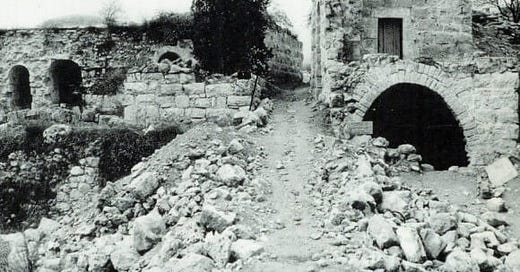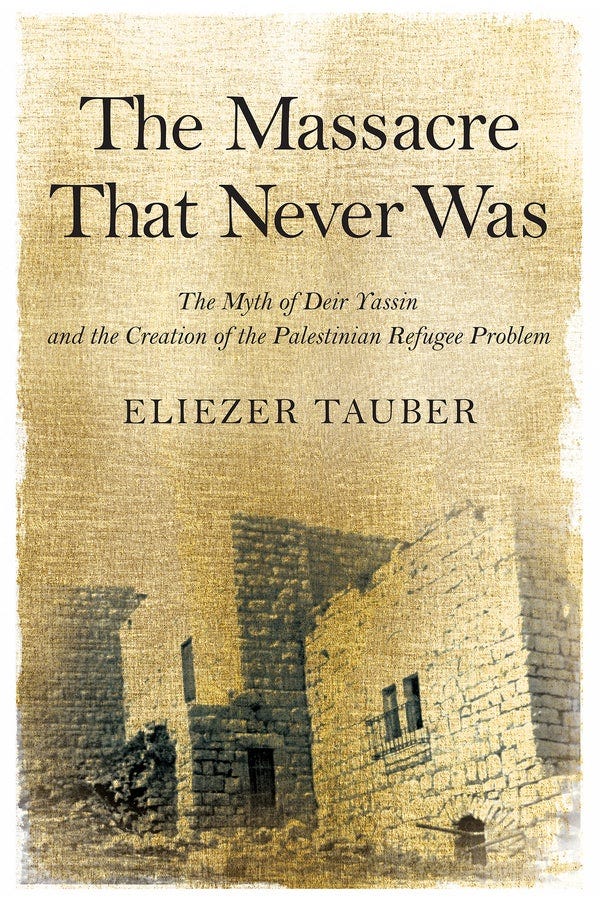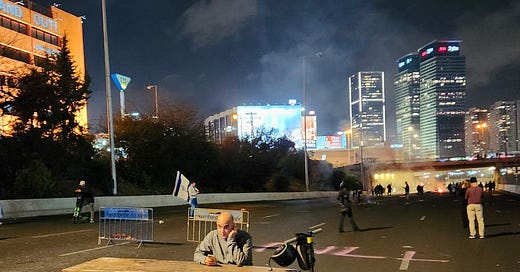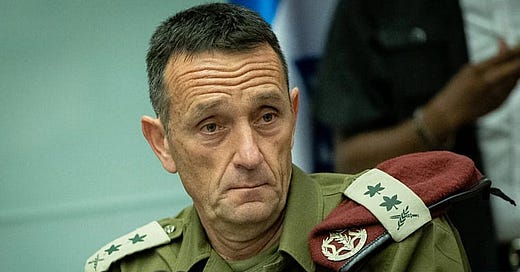

Discover more from Israel from the Inside with Daniel Gordis
"The Massacre That Never Was"
A recently published book offers a new take on a pivotal battle and an intentional mistruth that changed the course of history forever
The first time I ever heard of the Deir Yassin massacre I was in high school, attending a program at Young Judea, the Zionist youth group. As a means of provoking discussion about I’m-not-sure-what, the person leading the program told us about Deir Yassin, about how during the War of Independence, Israeli troops had entered the village and massacred dozens of Palestinians there.
I have no recollection of the discussion that followed. What I do remember is being almost dizzy—sickened by what he said had happened, and even more, entirely confused:
How was it that I’d never even heard of Deir Yassin until then?
If anything, the pendulum has since swung to the other extreme. If decades ago, it was the rare Jewish educational setting that would mention Deir Yassin, today precisely the opposite is the case: everyone talks about Deir Yassin, even if they have little idea of what actually transpired.
As we’ll see in a moment, we are all still figuring out what transpired, but here, in a nutshell, is the outline of the story, as it has been told for decades.
In March 1948, Arab forces successfully cut off Jerusalem from any outside Jewish settlements. Menachem Begin’s Irgun and Yitzchak Shamir’s Lechi, two of the underground paramilitary groups of the time, decided to help relieve the siege of Jerusalem. With the knowledge of the Haganah, the “official” military force of the yishuv (as the pre-state Jewish community of Palestine was known), they planned to take the town of Deir Yassin, from which Arab forces were shooting at the road that led to Jerusalem.
Barely trained and ill equipped, the Irgun fighters were unlikely to stand their ground in a real battle, but as the story was commonly told, no one expected significant resistance.
The operation began on April 9. A truck with a loudspeaker was sent to the village to instruct the villagers to leave or surrender. But the truck got stuck before it was close enough to be heard, the communication equipment between the Irgun and Lechi fighters (who entered the town from different sides) failed, and the fighters encountered far more resistance than expected. In their panic, the ill-trained fighters opened massive fire onto and into the houses in the village, with a horrendous death toll.
Early accounts suggested that 250 people had been killed, and that the Jewish fighters raped villagers. The Irgun admitted a high body count but insisted that the number of dead was closer to one hundred. It also absolutely denied the rape charges.
The denials fell on deaf ears, however, largely because all parties had reason to make the most of the charges.
The Haganah, falsely denying that it had approved the mission, used the incident to accuse the Irgun of being irresponsible and murderous.
The local Palestinians used it to claim to the international community that the Jews were butchering them and hoped to convince surrounding Arab countries to enter the fray (though they were unsuccessful in getting Arab countries to join the fighting before May 14).
And the yishuv as a whole, including Ben-Gurion, benefited from the Arab panic and the increased Arab flight that ensued.
Later scholars, including both Israeli and Palestinian historians, concluded that there had been no rapes whatsoever, and that the death toll was almost precisely what the Irgun had claimed. There was a heavy battle, to be sure, with heavy losses; but the horror stories of rape and hundreds dead were untrue.
That much we’ve known for a long time.
Israeli historians have long pointed to the events in Deir Yassin as one of the explanations for Arab flight during the war (and thus the Palestinian refugee tragedy which remains unresolved to this day). But they typically do so obliquely. Here, for example, is a passage from Israel: A History, the one-volume history of Israel by Professor Anita Shapira, one of Israel’s finest historians.
How could an entire population just get up and leave? Various contemporary explanations have been proposed. They include fear of the war and fear of the Jews, particularly after the Deir Yassin massacre in early April, in which Jewish fighters attacked an Arab village. Propaganda disseminated both by the Etzel, which was the main actor in the attack, and by the Palestinians magnified this event to dimensions of terror and atrocity far beyond what actually happened, which was bad enough. The prevailing version has it that there were 240 dead. However, updated studies by Palestinian researchers report that the number of dead was closer to 100 and refute the stories of rape that circulated.
As we’ll see in a moment, the “stories of rape that circulated” actually circulated because Palestinians consciously fabricated them, and in so doing, did everlasting damage to the fate of the Palestinian people.
A new book by Eliezer Tauber, a former dean at Bar Ilan University and an expert on the formation of Arab nationalism, has taken on the Deir Yassin story with painstaking attention to detail unmatched by any other study. Tauber’s conclusion is obvious from the title of the book. There was no massacre, he argues, but a hard-fought battle in which Palestinian combatants stationed themselves in residences and among family. Using both Arab and Jewish testimony from combatants on both sides and survivors of the “massacre” (testimony which often offered almost identical accounts), he was able to account for the circumstances of almost every Palestinian death in the village. With a handful of exceptions which he does not seek to paper over, virtually all those killed were killed as part of fighting—either because they were combatants, or because they were situated near combatants.
Tauber also notes that the level of casualties does not suggest an intentional massacre:
Of the 1,000 residents of the village, he notes, about 70% fled (the attackers permitted that), 20% were taken prisoner and later released, and some 10% were killed in the fighting.
That does not sound like an intentional massacre, he convincingly argues. For the most part, he says, “people in Deir Yassin were killed, not massacred.”
That distinction, of course, is critically important, particularly given the high profile role Deir Yassin continues to play in oft-made claims about Israel’s having been “born in sin.”
How the accusations of rape ended up shaping history
If the accusations of rape were false, and those who were present knew that they were concocted, how did the false claims come to be so widely believed? The Palestine Broadcast Service, Tauber shows, was instructed to say that there had been rapes, mutilation of bodies, murders and more. The PBS complied, and given the source, many people believed the claims without question. Amin al-Majjaj, an Arab physician in Jerusalem at the time, recalled that they had been told that “most of the women of Deir Yassin from the ages of six to seventy were raped.” That was what led the Arab population to flee. “We are not afraid of death,” one mukhtar said, “but will we not accept that our women be raped.”
‘Adil Yahra, a Palestinian historian who interviewed survivors of the battle, concluded that “the Deir Yassin affairs was the main cause for the 1948 exodus.”1. Hazim Nusayba, the Arabic news editor of the Palestine Broadcast Service, later reflected:
This particular strong communique … was one of the main reasons for the collapse of the armed resistance in Palestine. We did not understand the mentality of our own Palestinian people … This turned [out] to be the highest, most expensive mistake that we made.
So they fled, not only from Deir Yassin, but from across the land, as a result of accusations that Palestinians themselves had concocted.
Tauber does not suggest, of course, that there would have been no Palestinian exodus were it not for Deir Yassin. Though the pace of Palestinian flight picked up dramatically after Deir Yassin, the exodus had already begun. And given the borders that the UN had allocated to the emerging Jewish state, the yishuv had good reason to hope that there would be massive flight. Why?
The Arab state that the UN envisioned would have been home to almost no Jews (725,000 Arabs and a mere 10,000 Jews), while the “Jewish” state would be almost half Arab (498,000 Jews and 407,000 Arabs). That made both the existence of the Jewish state and the Jewishness of the Jewish state very tenuous.
The UN had created a scenario in which either the Jewish forces would seek to change the demographic balance, or they would end the war knowing that their state had little chance of survival.
Which is not to say that rapes never happened, sadly
In a western world in which increasing numbers of scholars and citizens cannot abide complexity or nuance (think the 1619 Project, or the ongoing battles about Critical Race Theory), Israelis—scholars and rank and file citizens alike—are embracing the complexity of the narratives. While Tauber agrees with Israeli and Palestinian historians that there were no rapes at Deir Yassin, other Israeli scholars have confronted deeply disconcerting evidence about rape in other instances and have not shied from pointing to it.
Contrary to the common Israeli narrative, Egyptian soldiers committed few atrocities during the War of Independence, though, as the noted Israeli historian Benny Morris notes, “this is explicable in terms of their general failure to conquer Jewish settlements.”2 But the yishuv’s troops did win, and at times, abused that power.
The picture that Morris paints has to discomfit anyone who cares about the moral climate of Israel’s formation:
… the Jews committed far more atrocities than the Arabs and killed far more civilians and POWs in deliberate acts of brutality in the course of 1948. This was probably due to the circumstance that the victorious Israelis captured some four hundred Arab villages and towns during April-November 1948, whereas the Palestinian Arabs and ALA failed to take any settlements and the Arab armies that invaded in mid-May overran fewer than a dozen Jewish settlements.
Morris thus hints that maters would have been very different, and quite possibly horrific on the atrocity front, had the Arabs won. In a dramatically understated sentence, he notes both Arab incitement to atrocity and their inability to act on it: “Arab rhetoric may have been more bloodcurdling and inciteful to atrocity than Jewish public rhetoric—but the war itself afforded the Arabs infinitely fewer opportunities to massacre their foes.”
It is apparently true that after the 1948 war, there were few, if any, rapes of enemy populations by Israeli soldiers. But 1948 was apparently sadly different. That, too, is part of what we need to confront.
Eliezer Tauber’s fascinating book reveals, therefore, the critical details of what did and did not happen in Deir Yassin on that fateful day, details that should (but undoubtedly will not) put to rest claims of massacre. There was killing, but not a massacre.
No less important, though, is Tauber’s illustration of how exaggerations of the carnage—intentionally concocted by the Palestinian press and others—led to widespread Palestinian flight and thus contributed to the Palestinian refugee problem. That is almost never discussed. Does that lessen the moral urgency of addressing the Palestinian problem? Probably not. But it should, at least, add nuance to the conversation about how to do so by highlighting that the causes of the problem are far more complex than many would like to acknowledge.
Other “massacres” that probably didn’t happen
Finally, it bears mention that Tauber’s book is part of a wider trend among some Israeli scholars who are upending long-held assumptions about massacres during the War of Independence and beyond. Another example is Martin Kramer’s masterful re-evaluation of the question of “What Happened at Lydda?”
You may recall that years ago, when Ari Shavit published a chapter of his (in many ways excellent and lyrical) book, My Promised Land, in the New Yorker, the chapter published was the one about the “massacre” at Lydda, also during the War of Independence, about which he wrote,
“In thirty minutes, two hundred and fifty Palestinians were killed. Zionism had carried out a massacre in the city of Lydda.”
That latter sentence infuriated many, since even if there was a massacre in Lydda, what did it meant to say that “Zionism” (rather than bad soldiers, for example) had committed the massacre?
That controversy festered for years, but it was only when Martin Kramer, the noted Israeli historian, began to look into the sources, that he, too, raised many doubts about whether there had been a massacre. Many deaths? Without question. An intentional massacre? In this case, very likely not.
With the publication of Tauber’s The Massacre that Never Happened, Tauber’s account of Deir Yassin and Kramer’s work on Lydda are now both available to the English speaking public. With the evidence so accessible, are those who accuse Israel of massacres going to read and re-think, or will they continue full steam ahead in accusing Israel of crimes that may well never have been committed?
That’s not the sort of question that Tauber nor Kramer address.
But then, again, we already know the answer.
In Thursday’s podcast, we’re in conversation with Yotam Polizer, the CEO of IsraAid.
Founded in 2001 as a coalition of Israeli organizations working in disaster relief and international development, IsraAID has grown into an independent NGO and the largest humanitarian aid organization in Israel. From earthquakes and hurricanes to epidemics and forced displacement, IsraAID has been at the forefront of responding to major humanitarian crises worldwide. It has worked in more than 50 countries and at any one time has around 300 staff members worldwide.
How did this phenomenon of a tiny country reaching out to assist with disasters far away begin? What motivates the Israelis who are involved and so deeply committed?
Here’s a brief excerpt from that discussion with Yotam. The full conversation will be posted for paid subscribers on Thursday, as usual.
And lots more coming after that, including a conversation with Natalie Marcus, one of the writers of the next season of Fauda, and Tehran, and The Jews are Coming.
Wishes to all for a healthy and successful 2022!
Our twitter feed is here; feel free to join there, too
Sources for these quotes are Tauber, “Conclusion,” pp. 170 ff.
Benny Morris, 1948: A History of the First Arab-Israeli War (New Haven and London: Yale University Press, 2008), Kindle Location 5694 ff, for this quote and the following.

















This is a very important article, but I think your implication that very few atrocities were perpetrated by the Arabs is an understatement. The best known in the cold-blooded murder of 127 defenders of Kfar Etzion on 13 May 1948 after they surrendered. In the battle of Sejera June 1948, the bodies of Golani soldiers killed in combat were mutilated by the Arab forces and their genitals stuck in their mouths. My mother-in-law, who served with Golani as a nurse, had to recover the bodies, and it traumatized her for life.
A good article on an important, though I would suggest, rather problematic book.
Take the allegations of rape. One of the key sources is an excerpt from a dossier of reports compiled in the aftermath by British law enforcement investigators. Tauber contends that the document states that the women would not talk to the officer and he assumed they had been raped. If we turn to the actual words, as transcribed in Collins and Dominique O Jerusalem, then a subtly different picture emerges. While the women were indeed traumatised and reticent, they 'need great coaxing before they will divulge any information' -- the clear implication being that, with effort, he *was* able to gather testimony from them and they revealed that they had been raped.
The document also states that 'corroborating physical evidence obtained through medical examination of survivors’. This again confirms that the officer, contrary to Tauber's reading, was able to elicit testimony from the female survivors and that medical evidence confirmed what they told him.